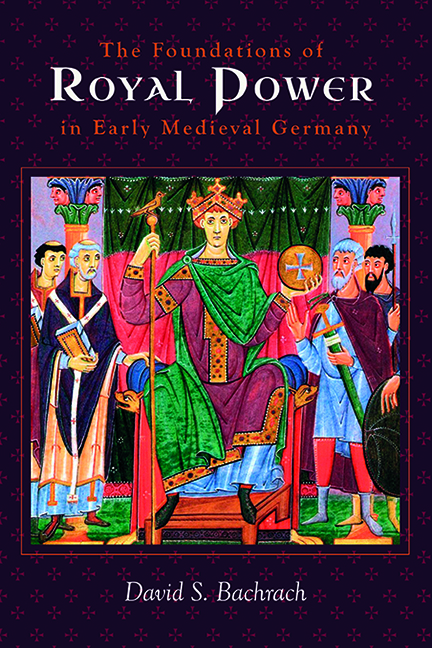 The Foundations of Royal Power in Early Medieval Germany
The Foundations of Royal Power in Early Medieval Germany Book contents
- Frontmatter
- Dedication
- Contents
- List of Illustrations
- Acknowledgments
- List of Abbreviations
- Maps
- Introduction
- 1 The Economy of Carolingian East Francia and Ottonian Germany
- 2 Material Assets of the Royal Fisc
- 3 Taxes, Tolls, and Other Regalian Rights
- 4 Ecclesiastical Resources at the Ruler’s Disposal
- 5 Toward an Analysis of Royal Expenditures: The Iter Regis and the Cost of Defense
- Conclusion
- Appendix 1 Fiscal Properties held by the Rulers of East Francia and Germany, 887–1106
- Appendix 2 Fortifications held by the Royal Government during the Reigns of Henry I and Otto I
- List of Key Terms
- List of Key Dates
- Bibliography
- Index
5 - Toward an Analysis of Royal Expenditures: The Iter Regis and the Cost of Defense
Published online by Cambridge University Press: 16 July 2022
- Frontmatter
- Dedication
- Contents
- List of Illustrations
- Acknowledgments
- List of Abbreviations
- Maps
- Introduction
- 1 The Economy of Carolingian East Francia and Ottonian Germany
- 2 Material Assets of the Royal Fisc
- 3 Taxes, Tolls, and Other Regalian Rights
- 4 Ecclesiastical Resources at the Ruler’s Disposal
- 5 Toward an Analysis of Royal Expenditures: The Iter Regis and the Cost of Defense
- Conclusion
- Appendix 1 Fiscal Properties held by the Rulers of East Francia and Germany, 887–1106
- Appendix 2 Fortifications held by the Royal Government during the Reigns of Henry I and Otto I
- List of Key Terms
- List of Key Dates
- Bibliography
- Index
Summary
As the previous three chapters have illuminated, the royal government of Ottonian Germany drew upon a very wide range of economic resources as well as rights to the labor and service of the population based on the ruler's bannum. The Ottonian kings (and queens), like their Carolingian predecessors, had at their disposal a substantial congeries of royal fiscal estates, which benefitted to a great degree from the overall growth in population and agricultural production during the course of the ninth, tenth and early eleventh centuries. This population growth also led to a concomitant increase in the production of manufactured goods as well as mining and smelting operations, some of which reached an industrial scale in the manner described by Adriaan Verhulst in his discussion of the economy of the Carolingian Empire. These revenues from the real assets of the fisc were augmented to a significant degree by a wide range of governmental taxes and tolls, which were also in a growth phase due to the overall demographic expansion and the concomitant increase in markets and trade. These fiscal elements of the king's regalian rights had their counterpoint in the ability of the royal government to demand not only corvée labor, but also military service from the entire free population and, in at least some cases, the unfree population as well. Just as important as these first two pillars of royal power was the obligation on monasteries and bishoprics to devote immense resources to feed and house the royal court and participate in the defense of the realm. This latter duty included not only the provision of military contingents to join the royal army on campaign, and the obligation to “loan” assets to provide beneficia for the king's fideles and milites, but also the construction, maintenance, and garrisoning of fortifications.
The natural corollary to an investigation of the material assets and regalian rights of the Ottonian kings is the question of what rulers did with this wealth. Put somewhat differently, what were the expenditures of the royal government, and perhaps even more importantly, on what scale were these expenditures?
- Type
- Chapter
- Information
- The Foundations of Royal Power in Early Medieval GermanyMaterial Resources and Governmental Administration in a Carolingian Successor State, pp. 231 - 270Publisher: Boydell & BrewerPrint publication year: 2022


